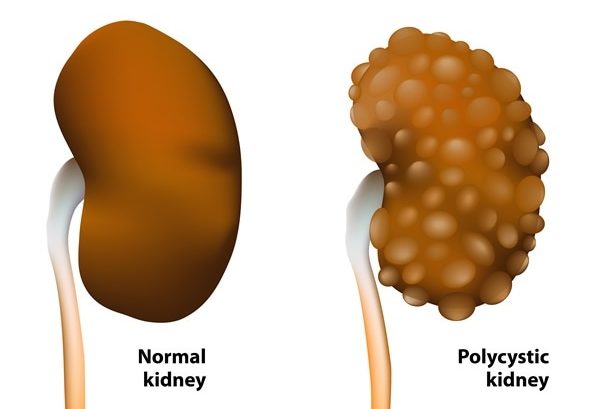Ayurvedic Treatment for Pkd
Polycystic Kidney Disease
PKD is an inherited kidney disorder. It causes fluid-filled cysts to form in the kidneys. PKD may impair kidney function and cause kidney failure.
PKD is generally inherited. Less commonly, it develops in patients who have other serious kidney problems.
There are three types of PKD.
Autosomal Dominant PKD (ADPKD)
According to UCM, ADPKD accounts for about 90 percent of PKD cases. This form of the disease is passed from parent to child by dominant inheritance. In other words, only one copy of the abnormal gene is needed to cause the disease. If one parent has the disorder, the chance of passing it down to their child is 50 percent (UCM, 2012). ADPKD is sometimes called adult PKD. Symptoms usually develop later in life, between the ages of 30 and 40. However, symptoms can start in childhood.
Autosomal Recessive PKD (ARPKD)
It is also inherited. However, both parents must carry the gene for the disease. This form of the disease is passed from parent to child by recessive inheritance. Symptoms can begin in the earliest months of life, even in the womb. It tends to be very serious, progresses rapidly, and is often fatal in the first few months of life. This form of ARPKD is extremely rare. It occurs in 1 out of 25,000 people.
There are four types of ARPKD:
- perinatal form (the disorder is present at birth)
- neonatal form (the disorder occurs within the first month of life)
- infantile form (the disorder occurs when the child is 3 to 6 months old)
- a juvenile form (the disorder occurs after the child is 1 year old)
Acquired Cystic Kidney Disease (ACKD)
ACKD is not inherited. It usually develops in patients who already have other kidney problems. It is more common in those who have kidney failure or are on dialysis. ACKD usually occurs later in life.
ACKD can happen in kidneys with long-term damage and severe scarring, so it is often associated with kidney failure and dialysis. About 90 percent of people on dialysis for 5 years develop ACKD. People with ACKD usually seek help because they notice blood in their urine. This is because the cysts bleed into the urinary system, which discolors urine.
What Are the Symptoms of Polycystic Kidney Disease?
The main symptoms of PKD include:
- pain or tenderness in the abdomen
- blood in the urine
- frequent urination
- pain in the sides
- urinary tract infection (UTI)
- kidney stones
- high blood pressure
Sometimes There Is No Symptom At All. Only A Simple Ultrasound Tells You To Have Cystic Kidneys.
Diagnosis
PKD is an inherited disorder.
Review family history. Initial test:
- a complete blood count (CBC) looking for anemia or signs of infection
- a urinalysis looking for blood and/or protein
Imaging tests used to diagnose PKD include:
- abdominal ultrasound: the most useful, non-invasive study using sound waves to look for cysts
- abdominal CT scan: can detect smaller cysts in the kidney; uses X-rays to build a cross-section of your abdomen
- abdominal MRI scan: uses strong magnets to image your body to visualize kidney structure and look for cysts
- intravenous pyelogram (IVP): uses a dye to make your blood vessels show up more clearly on an X-ray
Polycystic Kidney Disease Watch Video to Know More
Treatment
The goal of PKD treatment is to manage symptoms.
- pain medication
- blood pressure medication
- antibiotics (to treat UTI)
- a low-sodium (salt) diet
- diuretics (to help remove excess fluid)
- surgery (to drain cysts and help relieve discomfort)
With advanced PKD, dialysis and kidney transplant may be necessary. One or both of the kidneys may need to be removed.
Ayurvedic treatment for PKD is very useful in providing symptomatic relief. Ayurvedic formulations have no side effects like Allopathic medicine. Also, Ayurvedic medicines can maintain blood pressure & maintain urine flow to reduce future complications like ascites.
What Other Organs Besides The Kidney Are Affected By PKD?
PKD can affect other organs besides the kidney. People with PKD may have cysts in their liver, pancreas, spleen, ovaries, and large bowel. PKD can also affect the brain or heart.
Other Complications
- anemia (insufficient red blood cells)
- bleeding or bursting of cysts
- high blood pressure
- kidney stones
- recurrent urinary tract infections (UTIs)
- cardiovascular disease- mitral valve prolapse
- brain aneurysms
- diverticula (pouches or pockets in the wall of the colon)
- cataracts or blindness
- liver disease
Does Everyone With PKD Develop Kidney Failure?
No. About 50 percent of people with PKD will have kidney failure by age 60, and about 60 percent will have kidney failure by age 70. Certain people have an increased risk of kidney failure including:
- men
- patients with high blood pressure
- patients with protein or blood in their urine
- women with high blood pressure who have had more than three pregnancies
Prognosis
In most people, PKD slowly gets worse over time. It may lead to liver disease. Eventually, the disease ends in kidney failure.
Proper medical care can relieve PKD symptoms for years, managing it with Ayurveda can help.
Talk to a genetic counselor if you have a family history of PKD and are planning to have children.
Can Ayurveda HELP TO GET RID OF CYSTS?
Yes, there is an old saying “Where there is a WILL, there is a WAY”. We will say – If you have will, We will show you the WAY.
The Ayurvedic Treatment For PKD Will Have The Following Medicines:
Vridhivatika Vati
- Loknath Rasa
- Kanchnar guggul
- Vijaysar
For more information & for purchasing these products, you can call our helpline no. +91 8699017567( 8 AM to 8 PM IST)

